I took a class back in November, 2017 on introductory python @ Fab Lab KUET This is a summary of the things I covered. https://github.com/zabir-nabil/fab-lab-python-intro-workshop (in case you want to visit the github repo I created for the workshop!)
print("Hi there, Python 3") # How to print something?
Hi there, Python 3
semicolon
Where are those semicolons?
print('Hi '); print('there, '); print('Pyhton 3') # Interpreters vs Compilers
# Youtube streaming vs Downloading analogy
Hi
there,
Pyhton 3
a = input('a = ') # CLI
b = input('b = ')
a += '0' # string concatenation
b += '0' # operator overloading
print(type(a)) # string
print(a+b)
a = 16
b = 2
<class 'str'>
16020
a = input('a = ') # CLI
b = input('b = ')
a += '0' # string concatenation
b += '0'
print(type(a)) # string
print(a+b)
a = int(a) # type-casting
b = int(b)
print(type(b)) # integer
a += 5
b += 5
print(a,b,a+b)
a = 10
b = 5
<class 'str'>
10050
<class 'int'>
105 55 160
a = input('a = ') # CLI
b = input('b = ')
a += '0' # string concatenation
b += '0'
print(type(a)) # string
print(a+b)
a = int(a) # type-casting
b = int(b)
print(type(b)) # integer
a += 5
b += 5
print(a,b,a+b)
if a < b:
print('Just gonna print a 0')
elif a == b:
print('Just gonna print a 1')
else:
print("Can't predict :( ")
print(a//b)
a = 7
b = 17
<class 'str'>
70170
<class 'int'>
75 175 250
Just gonna print a 0
0
a little bit of modular arithmetic
-
How many multiples of $3$ are there in a list?
-
Find all such $y$ such that, $y = 57x + 13$ where, $0 <= y <= 1000$ and $x$ belongs to *$N$
# a_list = [1,2,3,4,5,6,7,8,9,10] # list
a_list = list(range(1,11)) # why 11?
print(type(a_list))
print(a_list)
for a_i in a_list:
if a_i % 3 == 0:
print(a_i,end = ' ')
<class 'list'>
[1, 2, 3, 4, 5, 6, 7, 8, 9, 10]
3 6 9
y_rng = range(1,1001) # why 1001?
print(type(y_rng))
for y in y_rng:
if y % 57 == 13:
print(y,end=' ')
<class 'range'>
13 70 127 184 241 298 355 412 469 526 583 640 697 754 811 868 925 982
! pip install future # Using pip
Requirement already satisfied: future in c:\anaconda3\lib\site-packages
packages, subpackages and modules
Requirement already satisfied: future in ‘dir’ ….
- Let’s see, how the directory ‘dir’ is organized
__init__.py, packages, subpackages, modules, namespace,__path__
from future.backports import datetime as dt
# year = input('year : ')
print(dt)
print(dir(dt),'\n') # dir() method tries to return a list of valid attributes of the object
today = dt.date.today()
print(today,'\n')
another_day = dt.date(2017,11,11)
print(another_day)
<module 'future.backports.datetime' from 'C:\\Anaconda3\\lib\\site-packages\\future\\backports\\datetime.py'>
['MAXYEAR', 'MINYEAR', 'PY2', '_EPOCH', '__builtins__', '__cached__', '__doc__', '__file__', '__loader__', '__name__', '__package__', '__spec__', 'absolute_import', 'bytes', 'date', 'datetime', 'datetime_CAPI', 'division', 'int', 'map', 'native_str', 'object', 'print_function', 'round', 'str', 'time', 'timedelta', 'timezone', 'tzinfo', 'unicode_literals']
2017-11-04
2017-11-11
python 2/3 compatibility and future
- run python 2 code from python 3 using past
from past.builtins import xrange # running python 2 in python 3
a = list(xrange(11))
a[0] += 2
a[0] **= 2
print('length of a = ',len(a),'\n')
a[len(a)-1] *= 2
print(sorted(a))
print('\n')
for x in xrange(11):
print(a[x],end = ' ')
print('\n')
a.sort()
for x in xrange(11):
print(a[x],end = ' ')
length of a = 11
[1, 2, 3, 4, 4, 5, 6, 7, 8, 9, 20]
4 1 2 3 4 5 6 7 8 9 20
1 2 3 4 4 5 6 7 8 9 20
from __future__ import division # running python 3 in pyhton 2
our own functions and default parameters
def,return
def my_fun():
print("Hi there, Python 3")
my_fun()
Hi there, Python 3
def your_fun(a,b,c=5):
print(a,b,c)
return a * b + c
k1 = your_fun(5,4,3)
print(k1)
k2 = your_fun(1,2)
print(k2)
5 4 3
23
1 2 5
7
def add_str(a, c, i_am_string=''): # why i_am_string is the last argument?
i_am_string += a
i_am_string += c
return i_am_string
st = add_str('a','b')
print(st)
st = add_str('c','d')
print(st)
ab
cd
let’s develop our lil_geometry module
go to a new fresh directorycreate a folder 'pack_lev1'inside, 'pack_lev1' create a python script named 'lil_geometry.py'
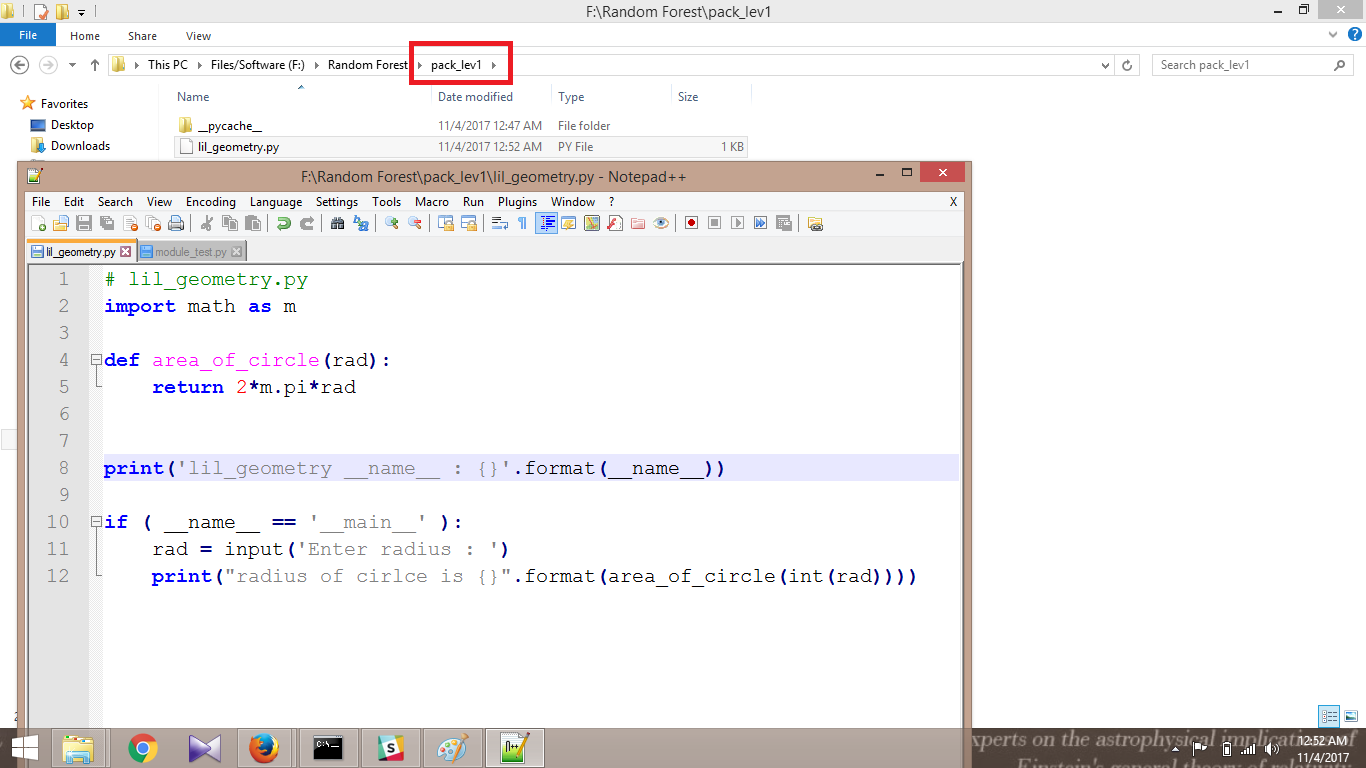
# lil_geometry.py
import math as m
def area_of_circle(rad):
return 2*m.pi*rad
print(__name__)
__main__
# lil_geometry.py
import math as m
def area_of_circle(rad):
return 2*m.pi*rad
print(__name__)
if ( __name__ == '__main__' ):
rad = input('Enter radius : ')
print("radius of cirlce is {}".format(area_of_circle(int(rad))))
__main__
Enter radius : 12
radius of cirlce is 75.39822368615503
module_test
go to rootcreate a script named 'module_test'
# testing module lil_geometry.py
from pack_lev1 import lil_geometry as lg
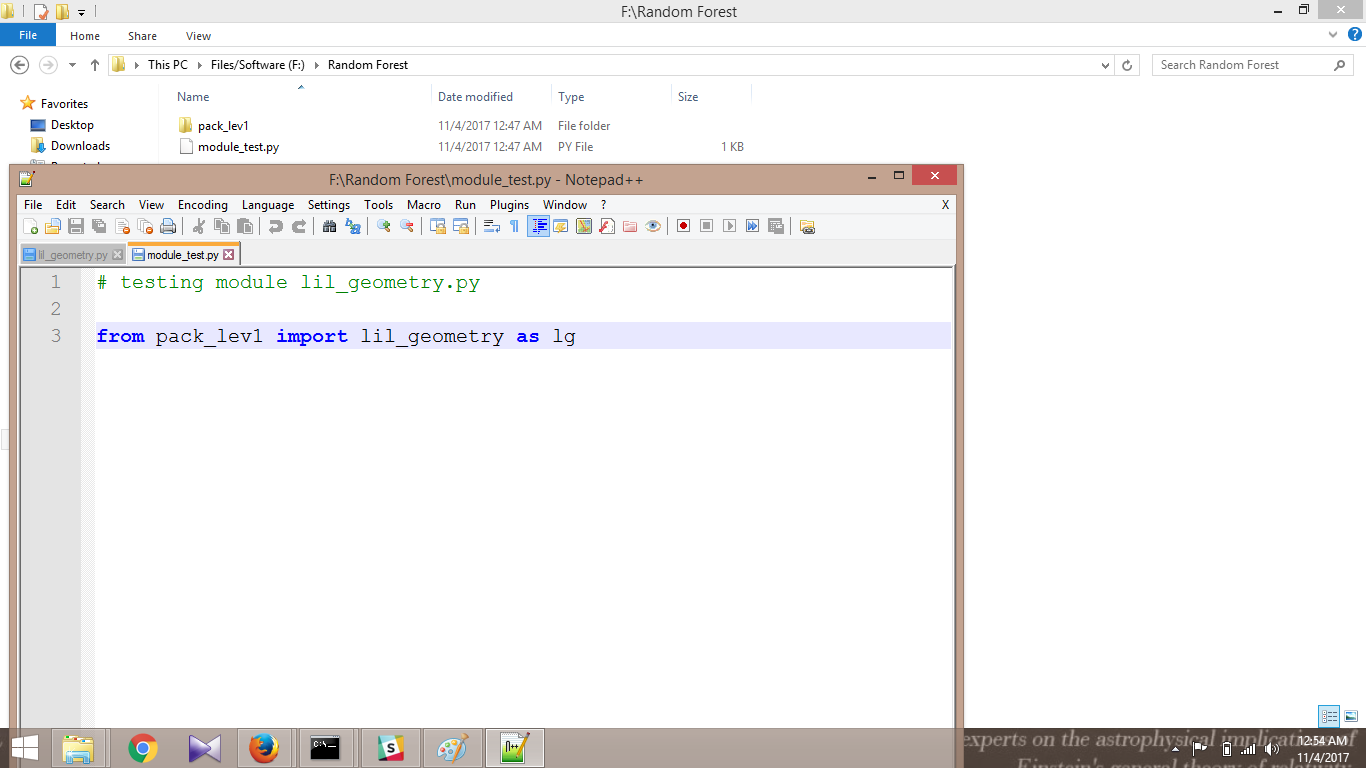
running module_test
open cmd in that folder and type 'python module_test.py'
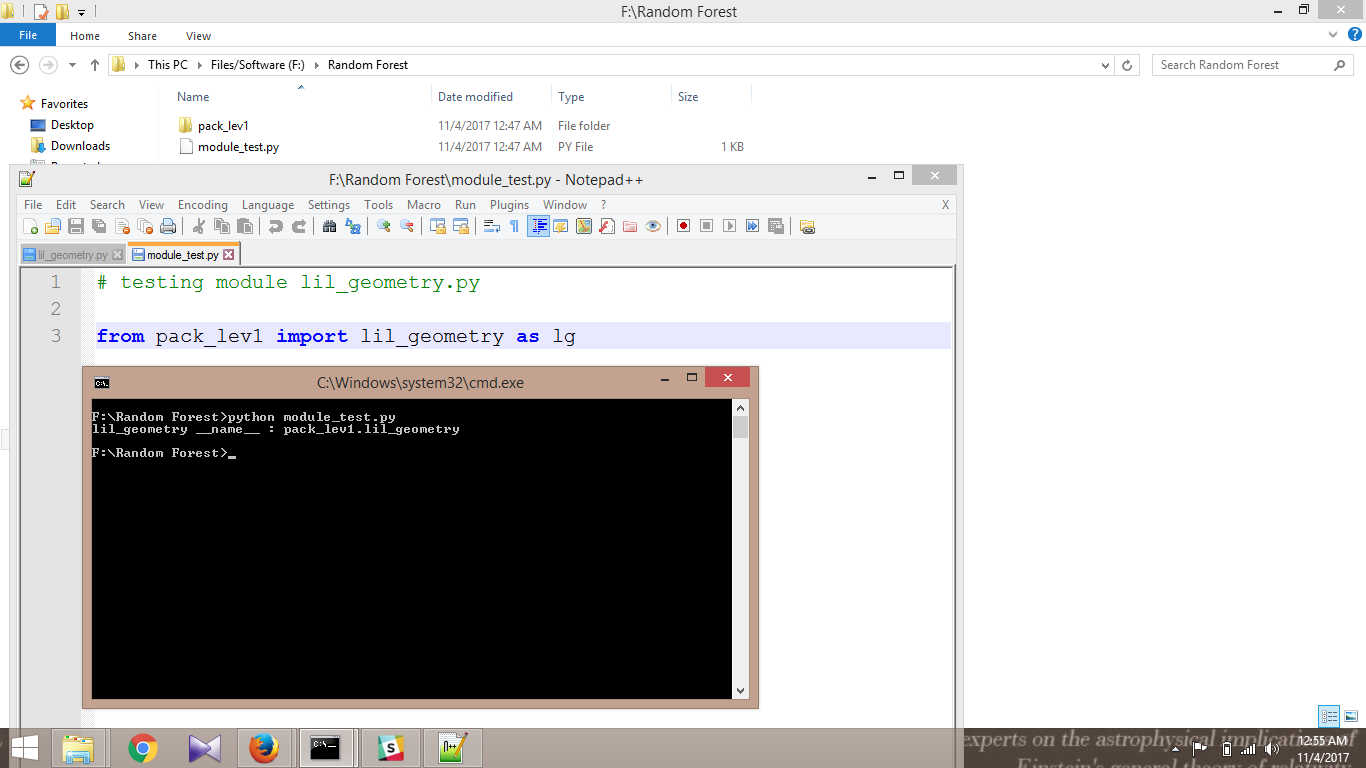
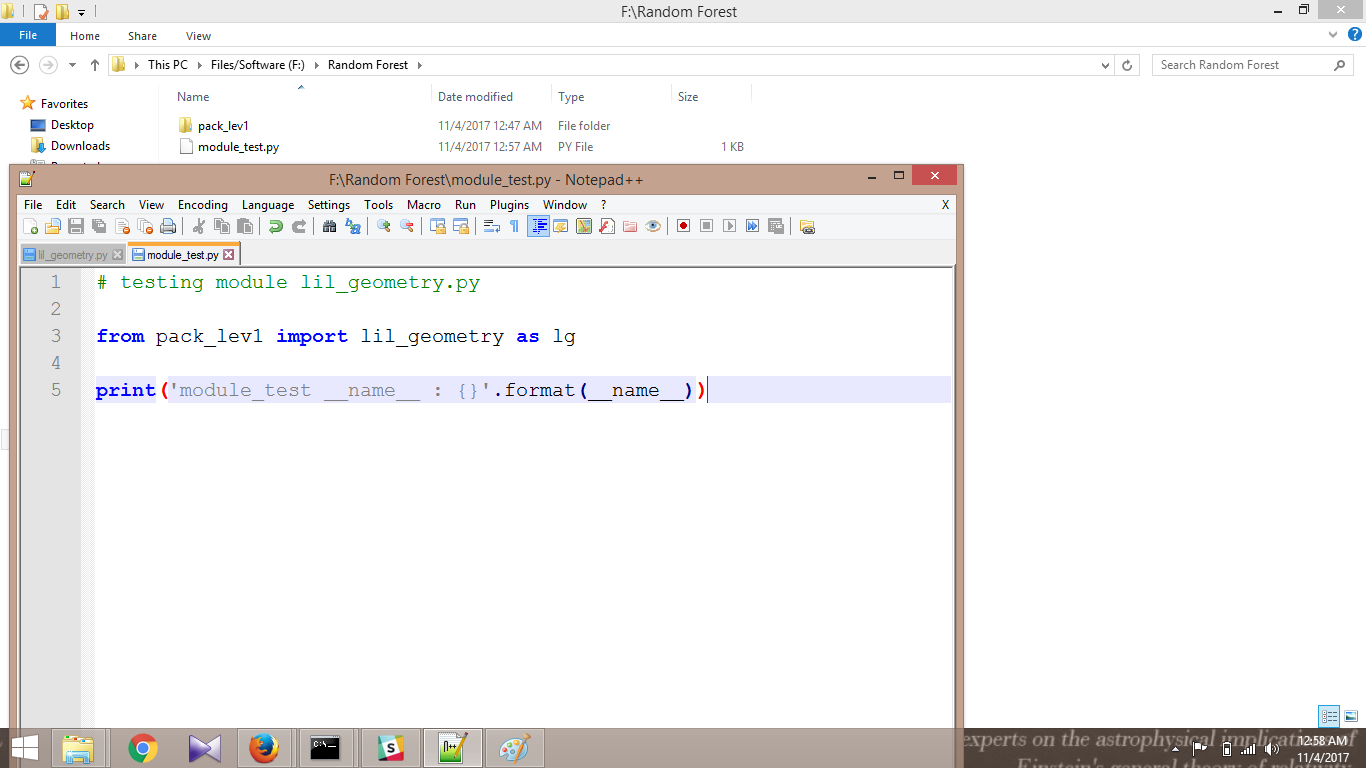
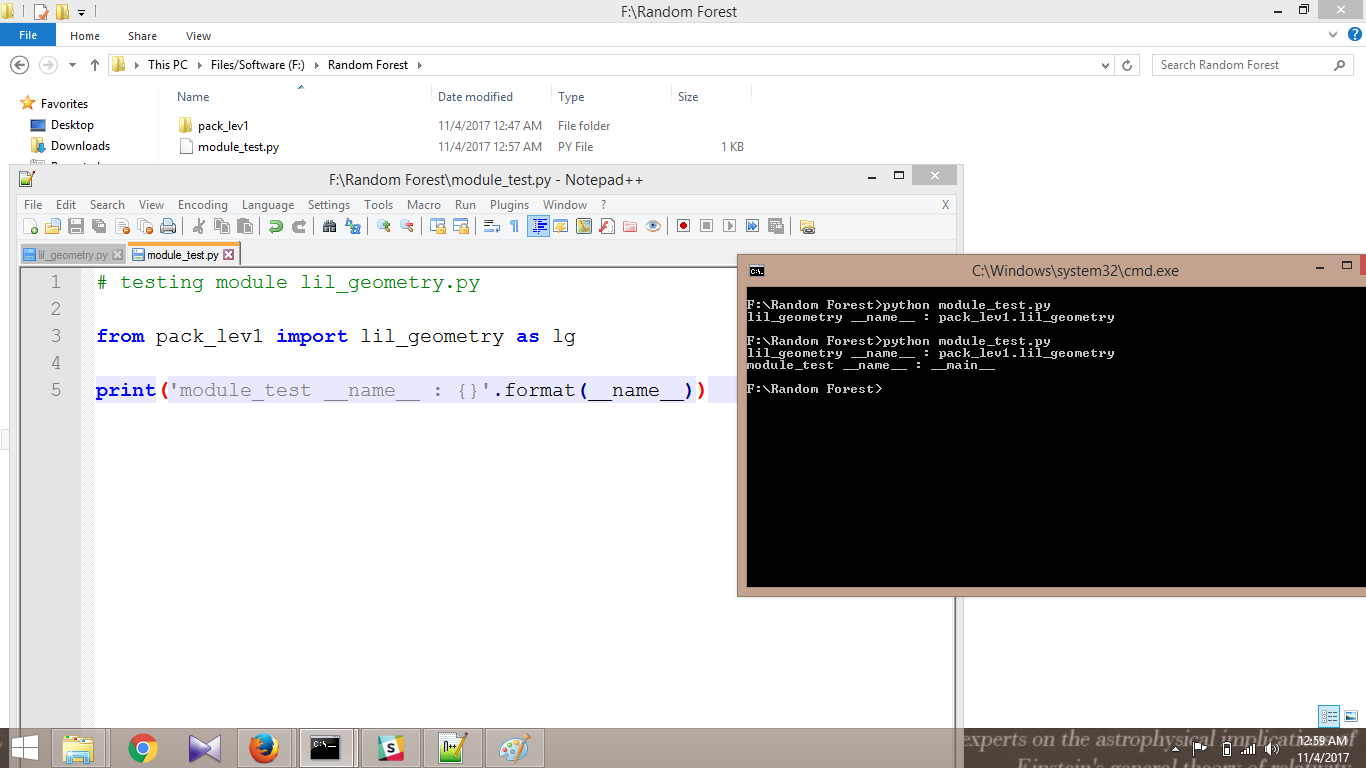
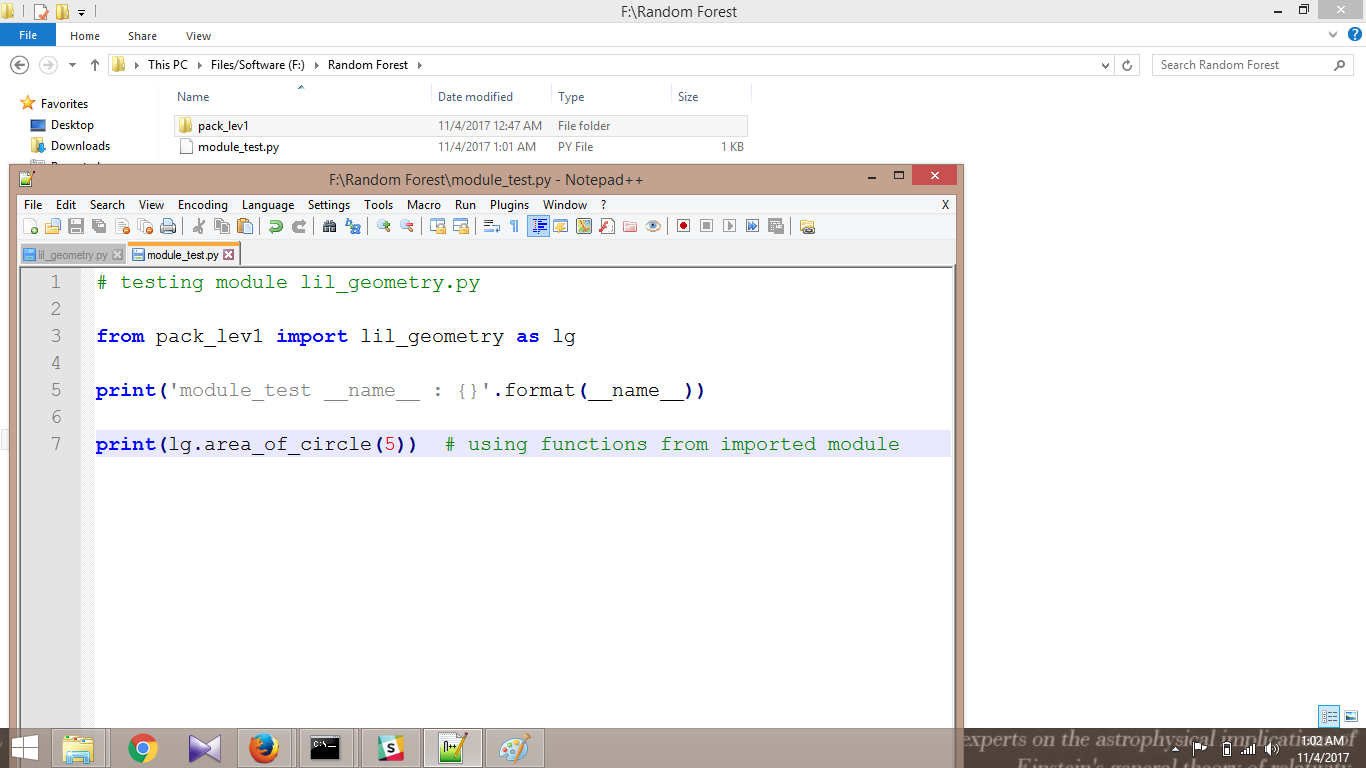
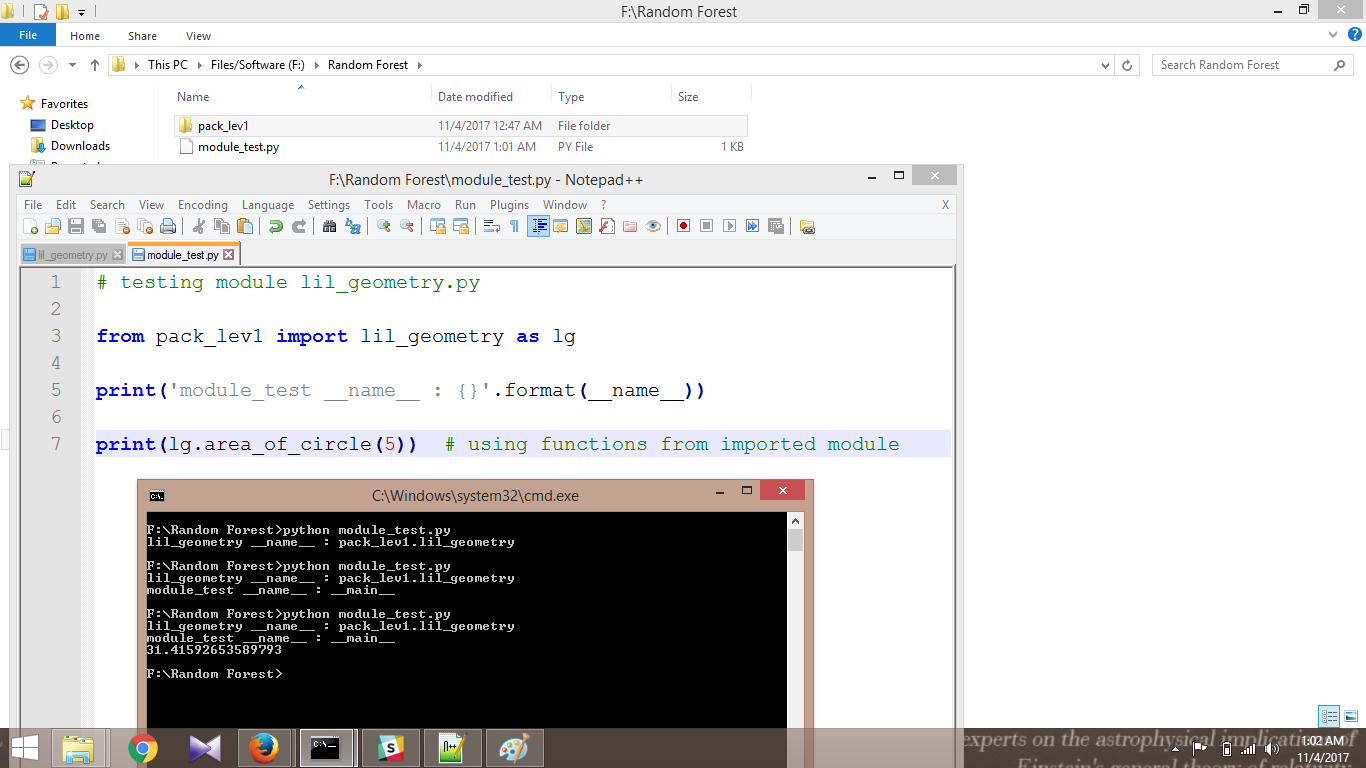
# testing module lil_geometry.py
from pack_lev1 import lil_geometry as lg
print('module_test __name__ : {}'.format(__name__))
print(lg.area_of_circle(5)) # using functions from imported module
github, git
- a break for me ` ` :P
- go to
https://github.comand open an account - verify email address
pip, easy_install and setup.py
https://github.com/pyjokes/pyjokes- clone this repo
- python setup.py install command
! cd
% pwd
'A:\\GitUps\\FabLabIntroPythonWorkshop\\fab-lab-python-intro-workshop\\Notebook'
- Go to the folder where you cloned pyjokes
- Shift + Right Mouse button -> Open CMD here
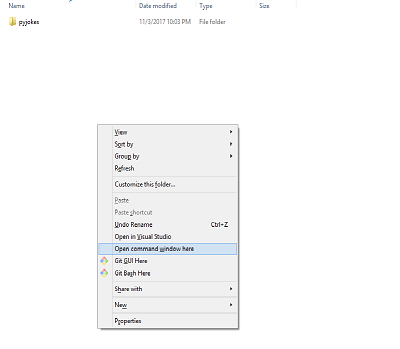
In cmd, type
pythonimport pyjokes as pja_joke = pj.get_joke()print(a_joke)
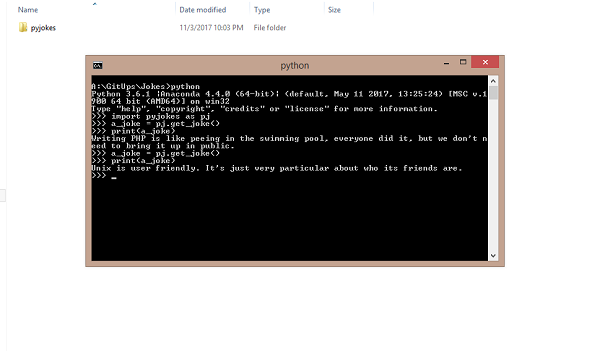
forget about pycharm for a moment
Go to a new fresh directoryCreate a new python script 'finally.py'Write some creative piece of code using just an editorOpen cmd in that folderpython finally.py
command line arguments
- sys
- argv
- argv[0] is name of the script

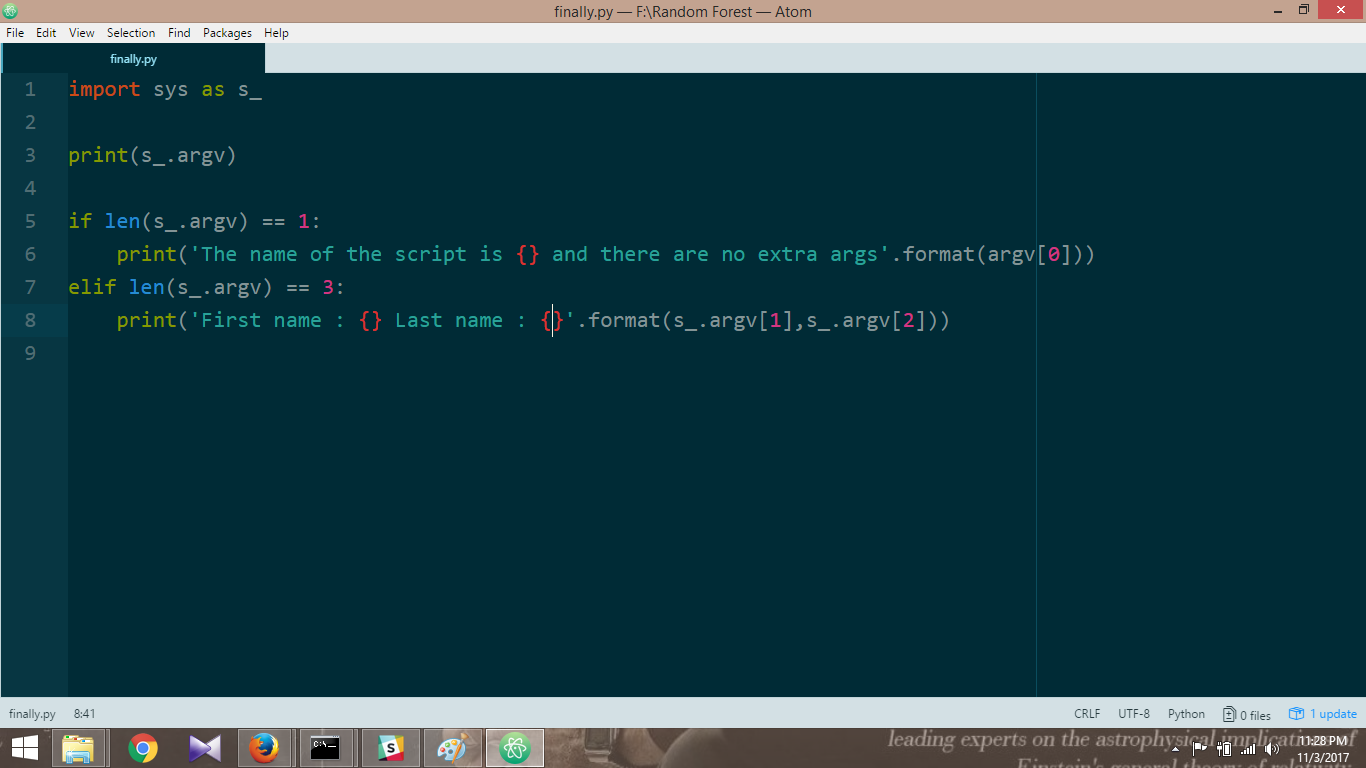
import sys as s_
print(s_.argv)
if len(s_.argv) == 1:
print('The name of the script is {} and there are no extra args'.format(argv[0]))
elif len(s_.argv) == 3:
print('First name : {} Last name : {}'.format(s_.argv[1],s_.argv[2]))
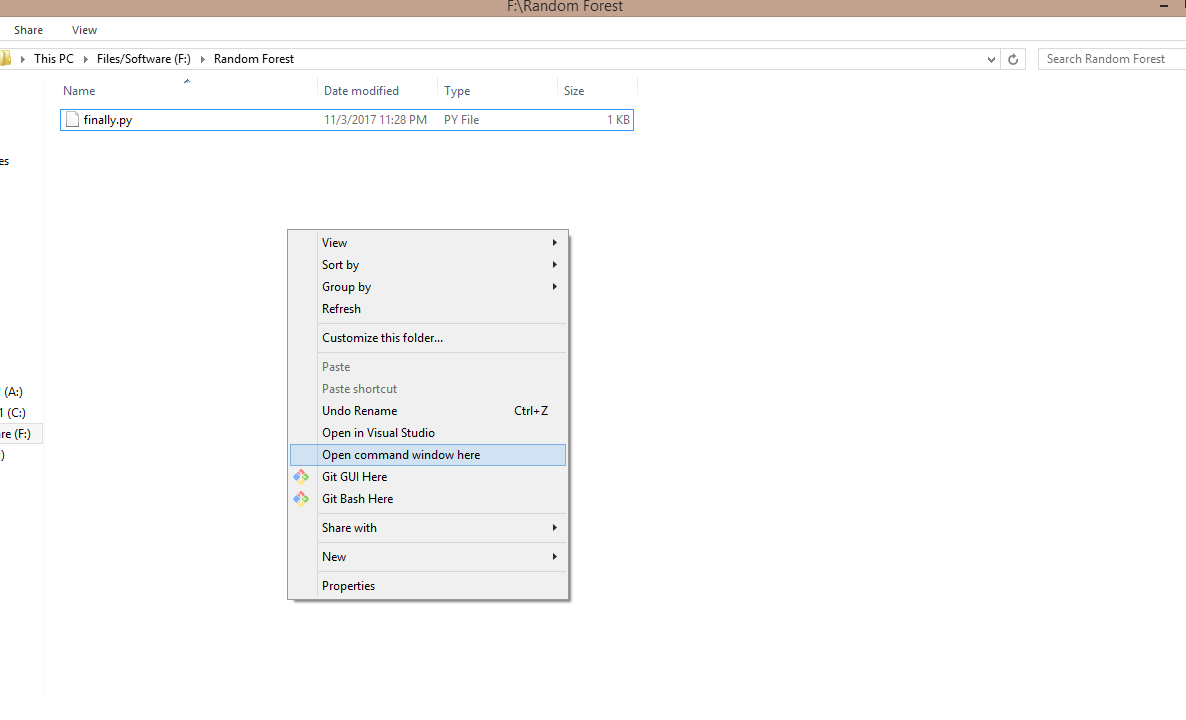
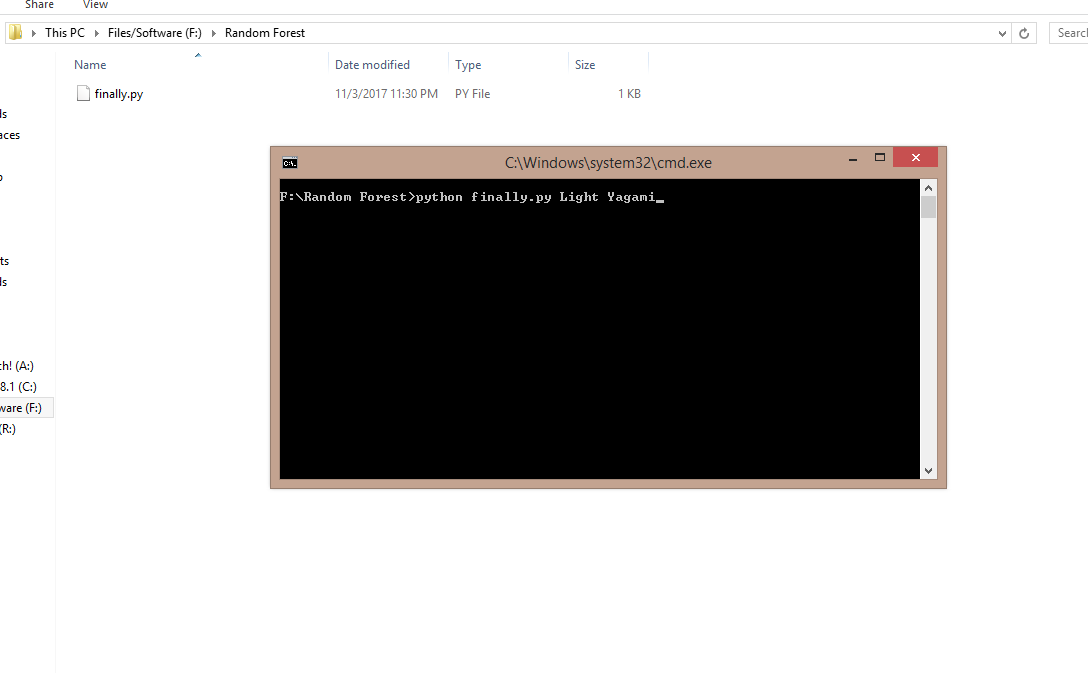
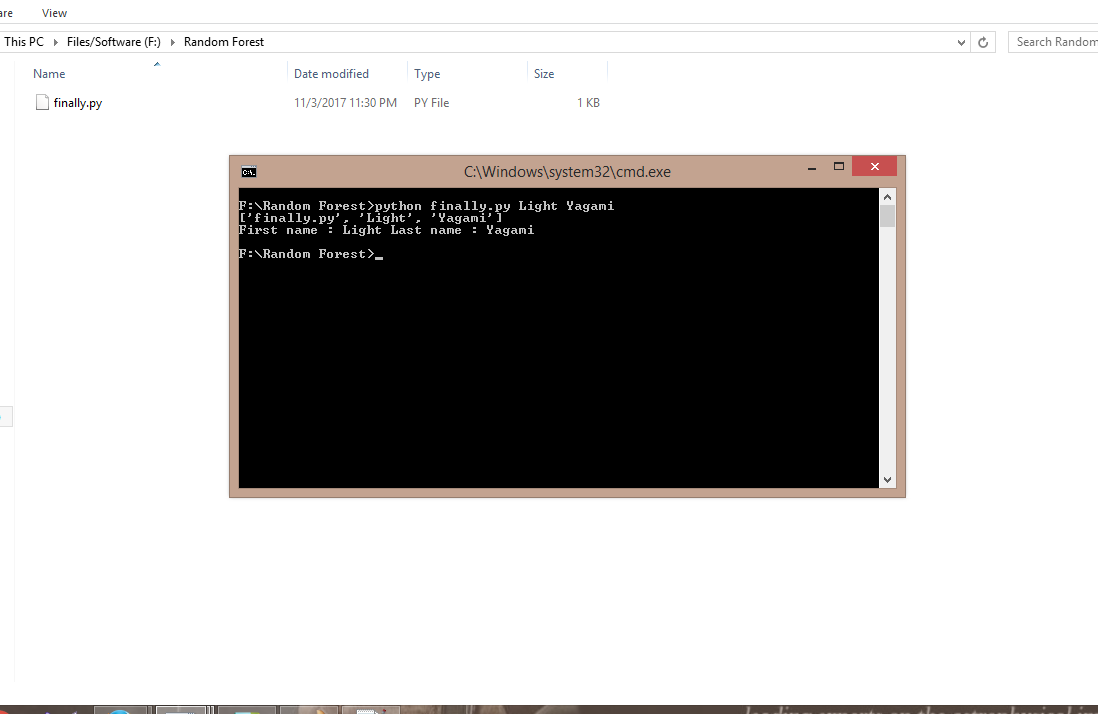
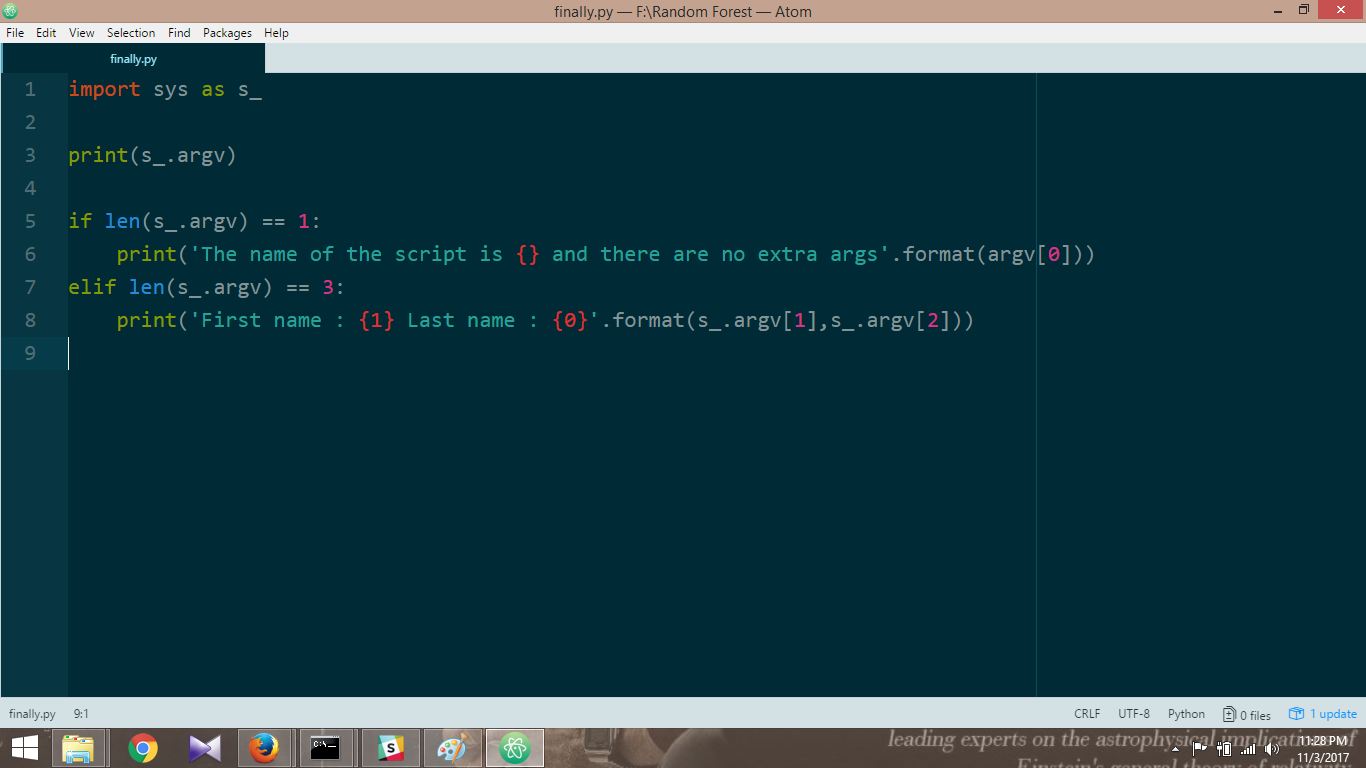
import sys as s_
print(s_.argv)
if len(s_.argv) == 1:
print('The name of the script is {} and there are no extra args'.format(argv[0]))
elif len(s_.argv) == 3:
print('First name : {1} Last name : {0}'.format(s_.argv[1],s_.argv[2]))
['C:\\Anaconda3\\lib\\site-packages\\ipykernel_launcher.py', '-f', 'C:\\Users\\zabir\\AppData\\Roaming\\jupyter\\runtime\\kernel-ffc5e574-b2b9-480f-b1ea-0b1b87f3d267.json']
First name : C:\Users\zabir\AppData\Roaming\jupyter\runtime\kernel-ffc5e574-b2b9-480f-b1ea-0b1b87f3d267.json Last name : -f
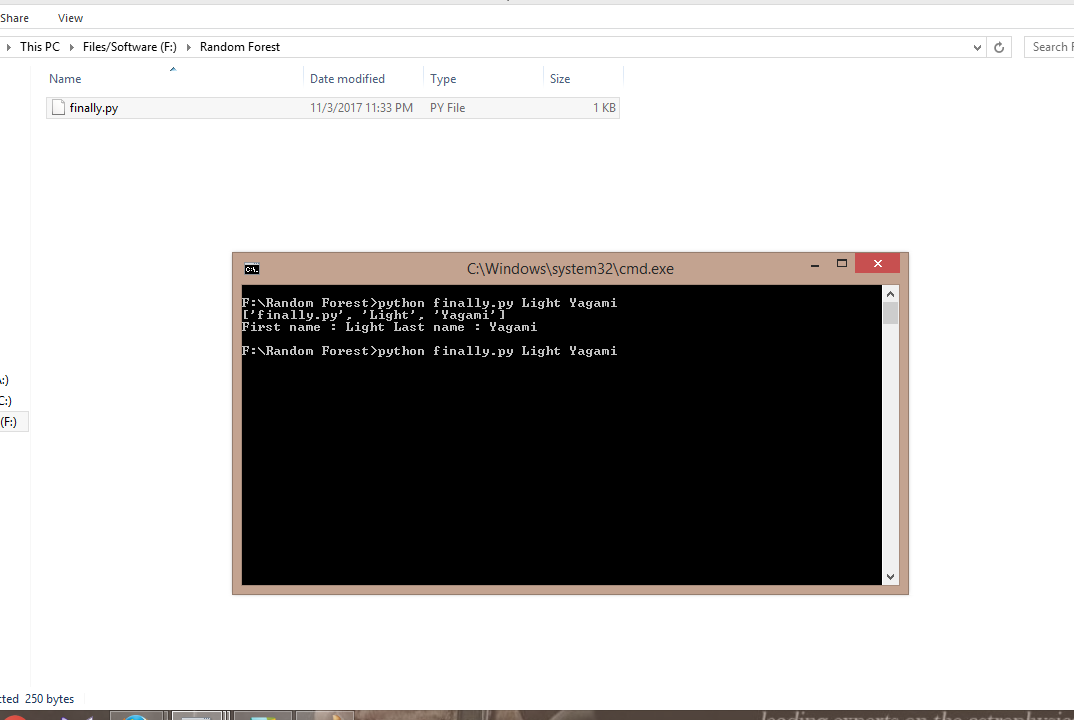
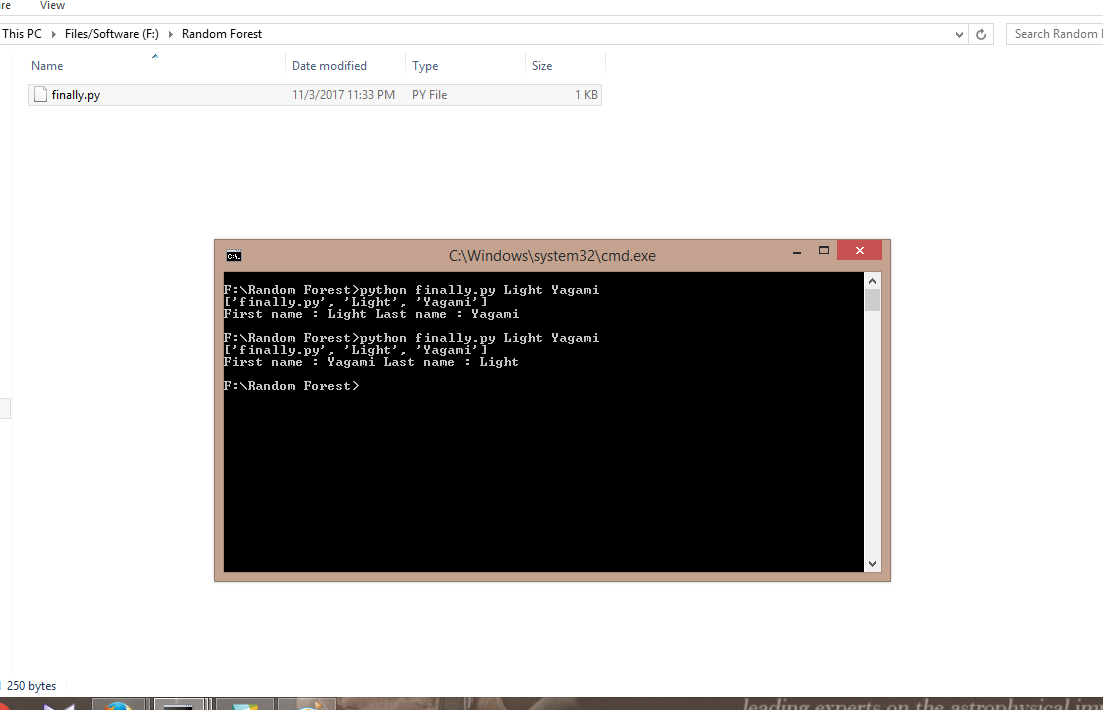
Existence is pain!